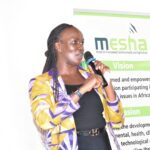By Mike MwanikI I mikemwaniki2016@gmail.com
A leading HIV investigator in Kenya has urged journalists to be at the forefront in dispelling the existing myths and misconceptions on vaccine trials among people living in African countries.
Prof Omu Anzala described as a “fallacy” allegations by some unscrupulous people — especially on social media — who are peddling claims that Africans are being targeted as “guinea pigs” by the West during such trials.
The virologist-cum-immunologist was speaking during a webinar held in May titled “Understanding the Role of Africa in COVID-19 Vaccine Research.”
The virtual meeting, which was co-organized by IAVI; Media for Environment, Science, Health, and Agriculture (MESHA), and Internews attracted African-based journalists and scientists and was moderated by MESHA’s secretary, Aghan Daniel.
“As a professional, I feel sad when people make such wild, unsubstantiated claims and allegations when diseases such as cervical cancer, malaria, and Ebola continue killing a majority of our people in the continent,” Prof Anzala observed.
“I have been conducting HIV clinical trials for over 20 years and I reassure you that vaccines are highly regulated and cannot, therefore, cause major adverse effects (to recipients). As Africans, we should steer away from such negativity,” he noted.
Prof Anzala is one of the founders of the Kenya Aids Vaccine Initiative (KAVI)—Institute of Clinical Research (KAVI-ICR) which was established in 2001 where he serves as the current director. He was Co-Principal Investigator (PI) of the first HIV vaccine trial in Kenya—the second in Africa—using a DNA plasmid.
According to the virologist, a recent study shows that 90 percent of health workers in Kenya are ready to be enrolled in testing for a COVID-19 vaccine safety if such a request was made to them. The Bill and Melinda Gates Foundation— which is the biggest funder of vaccines in the world—says that by April 9, 2020, 115 different COVID19 vaccine candidates were in the development pipeline “with eight to 10 of those looking particularly promising.”
Prof Anzala says as the COVID-19 virus continues to mutate, African scientists also have a role to play in searching for solutions against the global pandemic which by July 6, 2020, had infected 11.6m people, killed nearly 537,000 with 6.27m others recovering.
“The current precautionary measures to avoid COVID-19 infection through washing hands, social distancing and wearing masks in public places is just a stop-gap measure,” he warned.
“The only viable solution for the control of the virus is a vaccine as we are all susceptible to COVID-19,” added the Professor.
Vaccines offer protection from disease or infection by eliciting a long-lasting immune response. Fielding questions from journalists, Prof Anzala urged African countries to combat coronavirus by establishing mechanisms and actions that will respond to the outbreak; establishing teams that will monitor the outbreak and fund research to understand COVID-19/SARS-COV2 evolution (by using locally gathered data to inform the response to the outbreak).
Prof Anzala observed: “We are all learning as we go along. There are no experts (on the pandemic) as its only five months old”.
At the same time, the virologist announced that Kenya will be among 70 countries that will participate in the World Health Organisation’s (WHO) Solidarity clinical trial for COVID-19 treatments. Solidarity Trial is an international clinical trial to help find an effective treatment for COVID-19, launched by WHO and partners. It will compare for treatment options against the standard of care, to assess their relative effectiveness against COVID-19.






